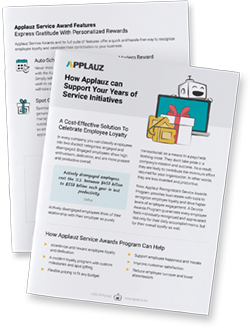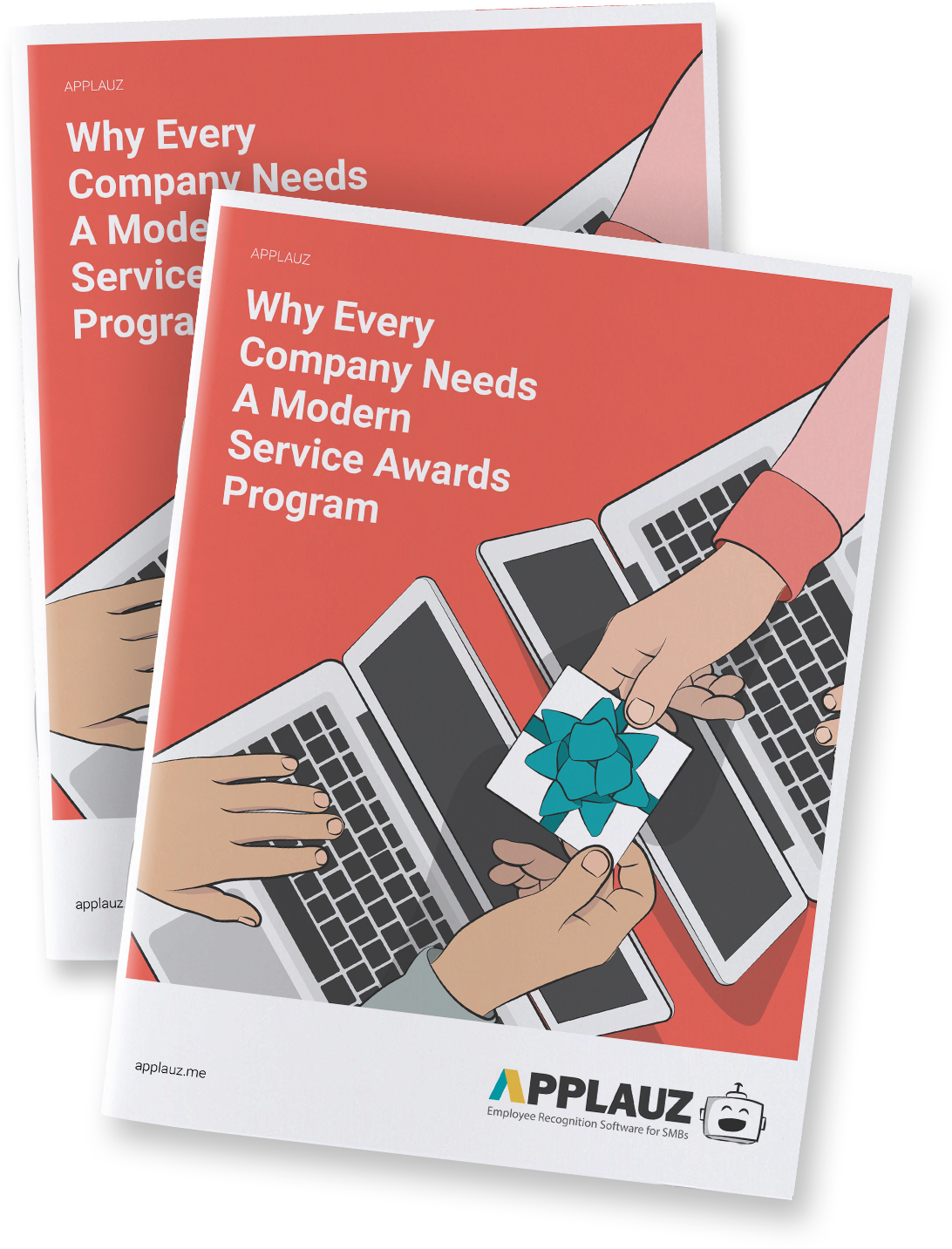The Cambridge Dictionary defines a reward as “something given in exchange for good behaviour or good work.” As a leader or HR professional, you know that rewarding employees should be a priority. You may even have learned that lesson the hard way by losing top talent or getting a negative employee review.
But there is a difference between giving employee rewards and giving employee rewards meaningfully. Far too many employers throw perks like free drinks or company swag at team members without realizing that these types of gestures miss the mark and do little for job satisfaction.
They may come from a well-intentioned place, but they signal that you haven’t put enough thought behind two crucial aspects of the employee reward experience:
- Rewarding employees in ways that they will actually appreciate
- Leveraging employee rewards in ways that actually make sense for your HR strategy
So, if you want to know how to reward employees the right way, here is what you need to focus on and what mistakes to avoid.
How Applauz can Support Your Years of Service Initiatives

Why Rewarding Employees is Important
Rewarding employees is about making people feel valued. This isn’t a “soft” business goal. When employees feel valued, it’s the beginning of a positive chain of events that has a direct impact on employee satisfaction, productivity, retention and organizational success.
They are motivated to do their best work. They derive a sense of belonging and purpose from their professional pursuits. They contribute to a positive team dynamic. They stick around. They become ambassadors for your employer brand.
In other words, when done right, employee incentive programs can skyrocket engagement and all the wonderful benefits associated with it, from increased productivity and retention to better morale.
 Common Employee Reward Mistakes
Common Employee Reward Mistakes
According to Sirota Consulting, only 51% of employees are satisfied with the recognition they’re given for their contributions. It makes sense – there are several common employee reward mistakes that are easy to make. Here are a few pitfalls to avoid when you recognize employees.
Giving rewards too frequently or infrequently
Give rewards too frequently, and you will dilute their impact, as they will lose their significance. The idea isn’t to reward employees for basic tasks but to find opportunities to give genuine, personal recognition. That said, most employers tend to fall into the other camp and don’t give enough recognition.
Sparse rewards can leave people feeling demotivated and undervalued. Employees who show up and care should feel recognized, even if the rewards are smaller. If you have younger workers, this mistake is all too easy to make.
According to Gallup, only 10% of Gen Z professionals strongly agree that recognition is a pillar of their workplace culture – about half the rate of older workers. Gallup recommends giving recognition every seven days to build a recognition-rich culture.
Not aligning the reward with the level of achievement
A Burger King employee recently went viral for receiving an underwhelming goodie bag for his 27th work anniversary. When the value of a reward doesn’t match the scale and significance of an achievement, your gesture can cause more harm than good.
For example, giving a mug as a small token of appreciation to someone who was likely expecting a promotion after driving sales for the entire year isn’t the best idea.
Consider creating different tiers or reward categories for different types of milestones and employee achievements. That way, your managers are equipped to give rewards effectively, plus you also encourage employees to aim their efforts in a way that is tied to earning rewards.
Creating a sense of unfairness
Creating a sense of unfairness is another common employee reward mistake that can sabotage your entire employee recognition strategy. Perceived unfairness can destroy morale and breed mistrust. This happens when team members feel that rewards are inconsistent or driven by favoritism.
Lack of transparency around reward criteria is often at the root of this problem. Clear communication around rewards and recognition is the antidote.
Establish straightforward guidelines for earning employee rewards and make sure they are based on objective metrics. Ensure these guidelines are consistently upheld, and equip managers with the tools to explain decisions to their team members.
Only giving one type of reward
Only giving one type of reward – say, a holiday bonus or gift cards for employee anniversaries – is a common mistake. It can make recognition feel impersonal and less impactful.
Plus, different people value different things. You might be surprised to learn that, according to McKinsey, up to 55% of employee engagement is driven by non-monetary incentives. Some employees may value financial incentives, others may prefer extra time off or opportunities for personal and professional growth.
A varied approach is more effective for boosting employee motivation, as it accommodates variations in preferences. From verbal praise to extra time off or fun team celebrations, aim for a well-rounded rewards strategy to motivate employees.
Not involving senior leaders in employee recognition efforts
Did you know that the person giving out the reward matters as much as the reward itself? A Gallup survey asked workers to reflect on who gave them their most meaningful and memorable recognition. Recognition from a manager (28%) or a high-level leader or CEO (24%) were the top answers.
You may not think that C-suite executives should reward employees, but they need to be involved in the process of rewarding employees, especially when celebrating bigger milestones and contributions. As for other leaders and managers, they should all be encouraged to give frequent, personalized recognition.
 The Dos and Don’ts of Employee Rewards
The Dos and Don’ts of Employee Rewards
Want to learn how to give employee rewards better than your competition? There are a few dos and don’ts to keep in mind to ensure a balanced, impactful approach. By paying attention to how rewards are given, you can avoid common mistakes and turn rewards into a motivating and meaningful part of the employee experience.
Don’t let rewards become meaningless
When rewards become mechanical, they lose their impact. Keep rewards meaningful by dishing out genuine praise and incentives for a job well done or exhibiting a unique strength or trait – not just for completing everyday tasks.
Do give personalized recognition on a regular basis
To strike the right balance, give employee rewards on a regular basis – at least every seven days when it comes to forms of employee recognition like praise and points. Showing consistent appreciation is key, as long as you aim to reward meaningful contributions and milestones without making rewards feel automatic.
Don’t set unrealistic expectations
Be careful about creating unrealistic expectations around employee rewards. If specific rewards are expected every time a goal is reached, people may end up focusing more on the reward than the quality of their work, or they could experience disappointment
Do align rewards with achievements
Make sure rewards reflect the significance of the accomplishment celebrated. Put a budget aside for major contributions and milestones. Smaller achievements can be acknowledged with thoughtful but simpler gestures.
Don’t leave unrewarded employees in the dark
Even with an inclusive employee rewards strategy, some team members may end up not getting rewarded based on the criteria involved. If that’s the case, it’s crucial to provide constructive feedback to set the employee up for success. Explain what specific actions or achievements could lead to future recognition to keep them motivated. Offer support. This conversation can go a long way in terms of preventing disengagement.
Do prioritize transparency and fairness
Transparency and fairness are crucial when it comes to employee rewards. Put together a set of objective, consistent criteria, and make sure they’re accessible and easy to understand. This practice prevents feelings of unfairness and resentment across the team. It reassures employees that rewards are based on merit – not favoritism.
Don’t give one-size-fits-all rewards
Avoid making recognition feel impersonal. Offer a mix of rewards and get to know – or encourage managers to get to know – team members on an individual level to cater to different personalities and preferences. Employees feel recognized when they are seen and celebrated for who they are.
Do offer a variety of rewards
Employee rewards are similar to love languages – what makes one person feel acknowledged may make someone else feel ignored. So, mix up the types of employee rewards you give to cater to the unique preferences of different team members. Consider using the Applauz Rewards Marketplace, which lets employees redeem points for the gifts of their choice.
Don’t overlook small wins
You know what they say: It’s about the journey, not the destination. While this isn’t completely accurate when it comes to rewards (reaching big goals warrants a big celebration!), don’t ignore the journey. Recognizing progress and effort matters as well and keeps employees engaged.
Do recognize both individuals and teams
Individual rewards are critical, but it’s important to reward teams as well. Team-based rewards send the message that you value collaboration and that you are working towards the same goals. They can foster a supportive, positive work culture while building a sense of unity and shared success.
 Employee Recognition and Rewards: The Bottom Line
Employee Recognition and Rewards: The Bottom Line
A well-thought-out employee rewards strategy can give you an edge and make you stand out from competitors. After all, a Josh Bersin study revealed that organizations with a “recognition-rich culture” largely outperform others, yet only 17% of respondents fit into this category. Looking at lists of popular employee incentives isn’t enough.
Align the right rewards with the right achievements, make sure employee recognition is frequent, personalized and genuine, and keep things fair. Avoid the mistakes above and use the best practices mentioned to build a rewards program that makes sense for your culture.
With its customizable options, rewards marketplace and user-friendly tools, Applauz can support your efforts and deliver better results. Embrace the opportunity to make recognition meaningful and let your team know just how valued they are.
Modernize your years of service program to boost engagement
About the author
Anouare Abdou
Anouare Abdou is a seasoned HR and business writer passionate about leadership, productivity, and the future of work. Her words have appeared in Business Insider, The Ladders, Thrive Global and more.

